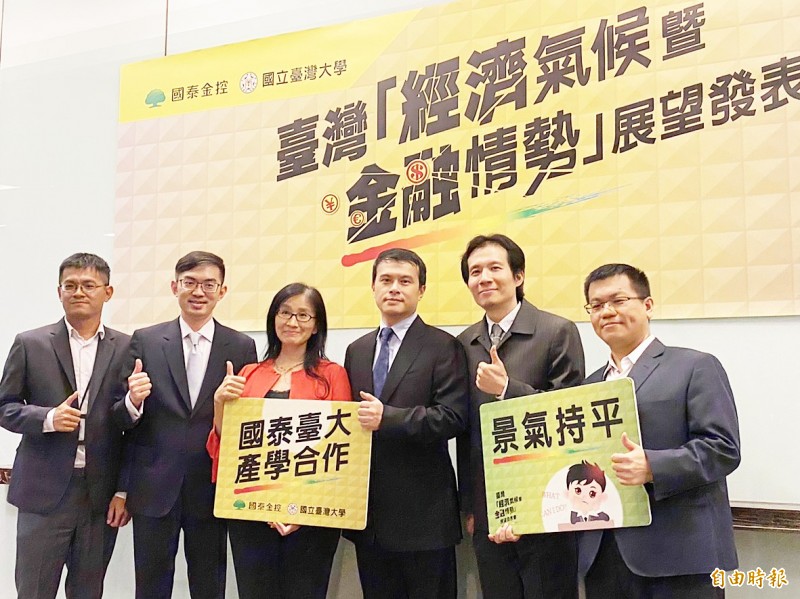《TAIPEI TIMES》Cathay lowers GDP forecast to 1.8%

Cathay Financial Holding Co chief investment officer Sophia Cheng, third left, National Central University economics professor Hsu Chih-chiang, third right, National Chengchi University associate professor of economics Hsu Shih-hsun, second right, and other research team members hold placards at a news conference in Taipei yesterday. Photo: Kao Shih-ching, Taipei Times
RELATIVELY UPBEAT OUTLOOK: Government spending would drive economic growth and private investment would increase 3.2% year-on-year, a researcher said
By Kao Shih-ching / Staff reporter
Cathay Financial Holding Co (國泰金控) yesterday trimmed its forecast for Taiwan’s GDP growth to 1.8 percent this year due to the COVID-19 pandemic, down from the 2 percent it predicted in March.
The company said that it expects investment and government spending to cushion the nation’s economy from the effects of the pandemic, making its forecast the most optimistic of all released forecasts.
The Directorate-General of Budget, Accounting and Statistics (DGBAS) predicted 1.67 percent growth, the central bank forecast 1.52 percent growth and DBS Bank Ltd said that it expects a contraction of 1 percent.
“We perhaps are more upbeat for [the] local economy than the government and our peers, but there are data that support our optimism,” said Hsu Chih-chiang (徐之強), an economics professor at National Central University who heads a research team commissioned by Cathay Financial.
Private investment would remain vibrant, increasing 3.2 percent year-on-year, as strong investment in the technology sector and offshore wind farm projects would offset delays in investments by companies affected by the outbreak, Hsu said.
Taiwan Semiconductor Manufacturing Co (TSMC, 台積電) has maintained its record-high capital expenditure of between US$15 billion and US$16 billion for this year, while major telecom carriers plan to spend tens of billions on 5G infrastructure, he said.
Government spending would also drive economic growth, as the government has increased its budgets for relief programs to help those affected, Hsu said.
Meanwhile, private consumption is expected to rebound in the second half of this year after retreating in the first half, Hsu said, adding that it should grow 0.5 percent annually.
Cathay Financial’s monthly surveys found that most consumers last month regained their interest in buying durable goods and making big purchases, Hsu said.
This could be attributed to the reduced spread of the virus and high hopes for the government’s Triple Stimulus Vouchers, which would permit 2.3 million Taiwanese and 150,000 foreign spouses to buy vouchers worth NT$3,000 for NT$1,000, he said.
Cathay Financial expects the vouchers to boost the nation’s GDP growth by 0.1 to 0.2 percentage points, or generate extra output of NT$200 billion to NT$400 billion (US$6.74 billion to US$13.49 billion), higher than the Ministry of Economic Affairs’ estimate of NT$111.2 billion, Hsu said.
“The main purpose of the vouchers is not to boost domestic spending, as the scale is modest, but to encourage consumers to spend at physical stores to support the real economy,” said Hsu Shih-hsun (徐士勳), an associate professor of economics at National Chengchi University.
Because of a possible global recession and a second wave of outbreaks, it would be challenging for exports to continue growing after rising 1.5 percent annually in the first five months of the year, whereas Taiwan’s tourism deficit is likely to improve, as people cannot travel overseas due to border controls, Hsu Chih-chiang said.
“Overall, we can see the light at the end of the tunnel ... we expect the nation’s economy to recover in the third and fourth quarters,” he said.
The research team said that it did not expect the central bank to cut its policy rates again this year, as the economy is expected to stabilize and the overnight interbank call-loan rate is already at a comparatively low level.
新聞來源:TAIPEI TIMES


















